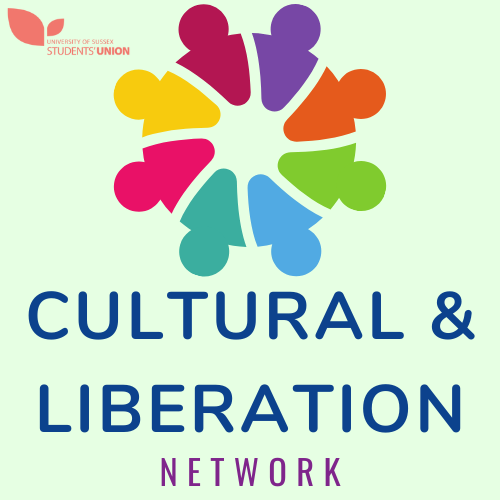Cultural and Liberation Network

The Sussex Cultural and Liberation Network was founded upon the principles of both celebrating the diversity of identity and meaningfully addressing the multiple layers of institutional oppression that young LGBTQ+ intersectional individuals, in particular, face by building solidarity to advocate for positive change. To this end, in our capacity as voluntary LGBTQ+ officers, we have continued to encourage Sussex to rethink how they view accessibility and inclusion of underrepresented minorities.
We have done this, for example, by creating educational HIV materials and coming out videos during HIV Awareness Month as well as creating a series of informative events during LGBT+ History Month. We released videos of the steps of using a HIV kit to decrease the stigma and fear around testing in addition to talking about the historical legacy of the AIDS epidemic that our community, particularly the POC community, still faces today. In addition, we created a queer archive full of protests and people being political by being proud, to demystify the social conditioning of not discussing taboo topics.
On the 21st Feb, we held a Protest with Pride, which itself contained banner making, launching rich holi colours, chalking words of affirmation, and having an LGBTQ+ intersectionality panel. We then ended the day with a Cultural Cabaret with signature cocktails, intersectional performers and cultural food, celebrating the diverse range of talent and uplifting the voices of the most vulnerable in our society. This had the effect of shattering stereotypes between different communities about themselves and others.
In addition to this, during One World Week, we led the creation of a queer badminton session with the first gender neutral changing rooms, seated badminton and lowered nets for gender non-conforming and disabled individuals. Therefore, forming an affirming framework to explore gender and sexuality through disability, faith and ethnicity is key to an evolving sense of self and identity and deconstructing internalised struggles and bias, in order to form emotionally stable individuals capable of loving themselves and loving others. Not only have we set a precedent for future events but by being visibly proud and not bound by traditional societal expectations, we provide role models that trailblaze and facilitate greater acceptance. As members of the LGBTQ+ community, we often face body issues due to having an unrealistic mental image of how they should look to be desirable and worthy. Proper nutrition and fitness fall by the wayside, and this badminton session was an easy gateway to sports that introduce our community to healthy activity. Thus in addition to having fun, releasing endorphins and being proud we handed out free t-shirts and rainbow laces.
In order to empower intersectional LGBTQ+ individuals, especially during tumultuous times when the queer community are more receptive to negative coverage, we fought to combat poor mental health during the World Cup games. With the assistance of Qatar born Dr Nasser Mohammed, not only did we release trans inclusive statements and signpost to resources but we worked with the managers of our local bars to provide an inclusive atmosphere whilst they showed the games. It was vital to both display queer flags and face paints but also fundraise for our local queer charity, Switchboard, by using donation points at the tills and tables. The effect of this is that we raise awareness of the international issues our communities face but also to fill individuals with pride, to counter the issues that became more prominent during this time.
As a result of our LGBTQ+ intersectionality panel we hosted, we continued to work on the discussion around mental health and whether the resources we offer are firstly promoted enough and secondly fit for purpose. Therefore, during University Mental Health Day, we created a mental health stall assessing the quality of care that mental health counsellors offer and whether the lack of diversity of these counsellors impacts how intersectional LGBTQ+ access their services.
Additionally, both LGBTQ+ officers led working and steering groups in order to eliminate deadnaming on profiles and integrate the first gender neutral map into our systems along with queer, disabled and BIPOC tags for events to help individuals better access services and events. We have also been actively involved in the complaints processes of other societies that have been racist and transphobic, working on management to build flexible systems that can deal effectively with discrimination. Due to feedback from the Cultural and Liberation Network, we have brought social interaction board games that would encourage individuals to overcome insecurities and expose them to sober and non-nightclub queer gatherings.
As only a few key examples of the work we have done, it is vital that we are recognised for the work that we do as volunteer part time officers. We hope this inspires others and helps to expand our platform to continue to build on the liberation work we have already done by having further human connections by engaging in the more underrepresented individuals in our queer community.
Services provided for
- Ace Spectrum Communities
- All LGBT+ Communities
- Brown, Black and Multi-Racial People of the Global Majority (PGM)
- Intersex/Variations in Sex Characteristics (VSC)
- Men
- People of Faith
- People with disabilities
- Women
- Young People
Key areas of work
- Advocacy
- Befriending/1:1
- Campaigning/Activism
- Disability
- Equal Opportunities/Discrimination
- Faith
- Gender
- Infrastructure/Community Development
- Mental Health
- Pride
- Self-help/Support Group
- Volunteering
Contact Details
Phone
01273 678152
Website
Opening Hours
Meeting Times
Every Wednesday at 5pm in Falmer House
